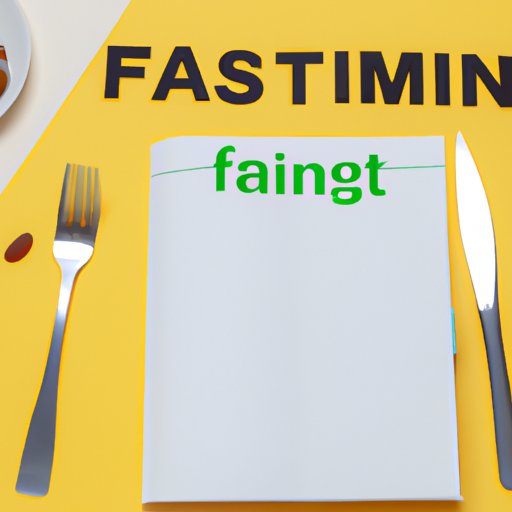
Introduction
For many people, losing weight and keeping it off can be a constant struggle. With a vast array of diets and weight loss programs available, it’s easy to get overwhelmed when trying to make the right choice for yourself. One weight loss strategy that has been gaining popularity in recent years is fasting.
In this article, we explore the science behind fasting for weight loss and what you need to know to get started and achieve your goals.
Does Fasting Really Help with Weight Loss? What Science Says
Fasting is an age-old practice, used for various reasons, including religious and cultural purposes. When it comes to weight loss, the theory behind fasting is simple: by temporarily limiting calorie intake, your body will burn stored fat for energy instead of the calories you consume, leading to weight loss.
Studies have shown that fasting can lead to weight loss in various ways, including reducing calorie intake, boosting metabolism, and increasing fat burning. When your body is in a fasting state, it produces more human growth hormone (HGH), which can help increase metabolism and burn more calories.
Additionally, fasting can help trigger what’s called autophagy, which is the body’s natural detoxification process. This can help the body to rid itself of damaged cells and regenerate new ones, which could lead to improved health and longevity.
However, fasting is not without its risks. It can lead to dehydration, dizziness, and other adverse effects. Fasting can also lead to malnourishment if not done correctly or if continued for an excessively long time.
Intermittent Fasting for Weight Loss: What to Expect and How to Do It Safely
Intermittent fasting is one of the most popular fasting methods used for weight loss. It involves alternating periods of eating and fasting to create a calorie deficit. There are various intermittent fasting methods, including:
- 16:8 method: Eat within an eight-hour window and fast for the remaining 16 hours.
- 5:2 method: Eat normally for five days and limit calories to around 500-600 for the remaining two days.
- Alternate-day fasting: Eat normally every other day and fast for the remaining days.
It’s crucial to start intermittent fasting slowly and gradually make changes to your diet to avoid any adverse effects on your health. It is essential to maintain a healthy and well-balanced diet by eating fresh fruits and vegetables, lean proteins, and whole grains.
It’s also essential to stay hydrated throughout the fasting period by drinking water and other healthy fluids. Besides, it’s advisable to avoid strenuous physical exercise during your fasting period to save energy.
The Benefits of Fasting Beyond Weight Loss
The benefits of fasting go beyond weight loss. Below are some additional benefits to consider:
Improved Insulin Sensitivity
Fasting can improve insulin sensitivity, which helps the body utilize insulin better and decrease the risk of type 2 diabetes.
Reduced Inflammation
The process of fasting can help reduce inflammation, a condition that has been linked to various chronic diseases such as heart disease and cancer.
Improved Heart Health
Intermittent fasting has been shown to improve heart health by enhancing blood pressure, triglycerides, and cholesterol levels.
Improved Brain Health
Fasting is believed to improve brain function and enhance neuroplasticity by promoting nerve cell growth and protection.
Increased Longevity
The process of fasting has been linked to increased longevity by promoting cellular renewal through autophagy and helping protect against age-related diseases.
Exploring Different Types of Fasting and Their Impact on Weight Loss
There are various types of fasting methods, including water fasting and juice fasting. Water fasting is when you consume only water for an extended period, while juice fasting involves consuming only freshly prepared juices.
Water fasting can lead to significant weight loss in a short period. This can be great for breaking through weight loss plateaus and jump-starting a new healthy lifestyle. However, there are some risks associated with water fasting, including dehydration and electrolyte imbalances, which can lead to long-term health concerns.
On the other hand, juice fasting is a more moderate form of fasting that can provide some of the benefits of water fasting without the associated risks. However, juice fasting is not ideal for long-term weight loss, as it often involves consuming large amounts of sugar in the form of natural fruit sugars.
Fasting for Weight Loss: A Step-by-Step Guide to Help You Get Started
Are you considering incorporating fasting into your weight loss journey? Here’s a step-by-step guide to help you get started:
Setting Realistic Weight Loss Goals
Before starting any fasting program, it’s essential to set realistic weight loss goals that are achievable. Discuss your weight loss goals with a healthcare provider to ensure that they are realistic and sustainable.
How to Prepare for Fasting
Preparing for fasting is essential for success. Start by gradually limiting your food intake and reducing the number of calories you consume, and increase your hydration levels by drinking more water.
Tips for Maintaining Motivation during Fasting
Fasting can be challenging, especially when getting started. To stay motivated, consider joining a support group or working with a healthcare provider to stay accountable.
Adjusting Your Diet and Exercise Routine to Support Fasting
Adjusting your diet and exercise routine is essential to support your fasting periods. Consider incorporating whole, nutrient-rich foods into your diet and reducing processed and packaged foods. You can also incorporate low-impact exercise like yoga or walking to help maintain energy levels and enhance weight loss.
Conclusion
Overall, fasting can be an effective method for weight loss, improved health, and increased longevity. However, before starting any fasting program, it’s essential to consult a healthcare provider to ensure that fasting is safe for you.
Remember to start slowly and choose a fasting method that works for your lifestyle and weight loss goals. With determination, persistence, and a solid plan in place, fasting can help you shed those extra pounds and keep them off for the long haul.





